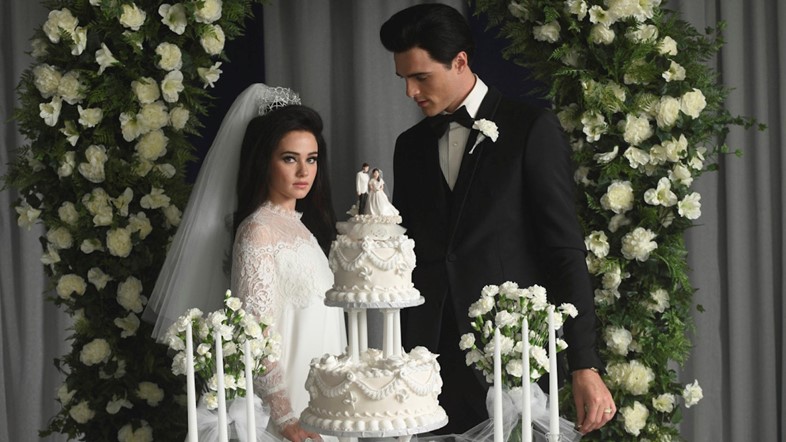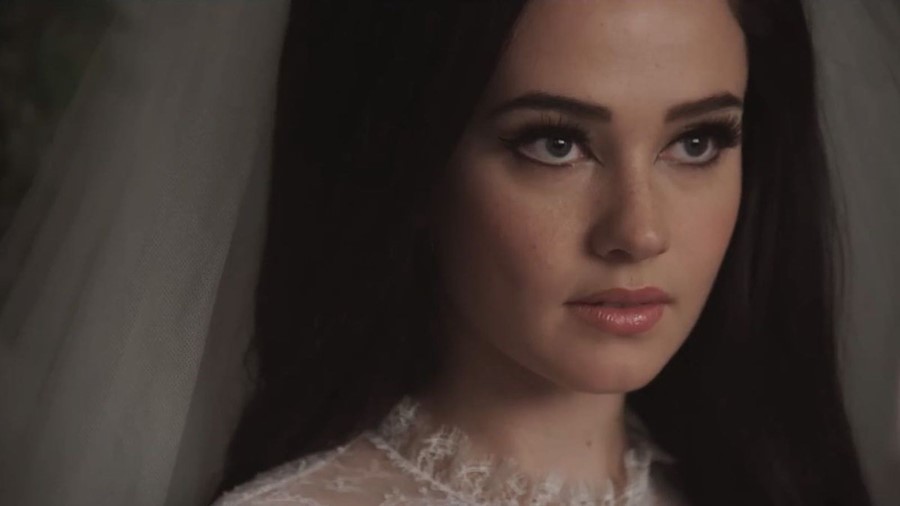A charismatic man, a girl in love, an age gap and a power differential: Sofia Coppola’s Priscilla biopic is sympathetic and cautionary about the appeals of losing oneself in the arms of a man, writes Christina Newland
This article was originally published on November 13, 2023
Sofia Coppola has long excelled in externalising a particular kind of girlhood angst in a way that detractors of her work have called superficial. This very pretty form of suffocation might be part of the point – we often relish in the very things that may trap us in the end – and it is very much the thesis of her latest film, Priscilla. An elliptical, poetic exploration borrowing from the memoirs of Priscilla Beaulieu Presley (Elvis and Me) and with the 60s icon as an exec producer, the film is less a traditional biopic and more the portrait of a strange, seductive, and ultimately poisonous marriage from beginning to end.
And in spite of being about one of the most recognisable couples of the era, Priscilla’s rhythms feel curiously identifiable across much of womanhood. It’s the stuff of pop culture legend, but scratch the surface with one long pointed fingernail and it’s a story that is frighteningly familiar: a handsome, charismatic man; a girl in love; an age gap and a power differential; an identity melding into someone else’s with the unfurling, warm, sensual power of Tommy James and the Shondells’ “Crimson and Clover” playing in the background.
Starring a remarkable Cailee Spaeny, whose performance must span the ages of 14 to 30 in the film, the film begins with the pair’s meeting – when Priscilla is a teen virgin in saddle shoes sipping milkshakes in a West German diner – in an American army base where her father is high-ranking. Elvis Presley, the controversial hip-shaking King of Rock’n’Roll, was 24 when he met her. Presley, played here by Jacob Elordi, is smartly cast as a tall, handsome drink of water who towers over his teenage quarry both physically and psychologically.
From the coolly isolated luxury hotels of Tokyo to the literal palace of Versailles, Coppola’s cinematic worlds are often gilded cages, with her female protagonists suspended in adolescence in perpetuity, one way or another. Be that the frozen-in-aspic deaths of The Virgin Suicides or the life of the teen queen of France, betrothed and separated from her entire family in Marie Antoinette, it’s a clear theme. Coppola herself has said in interviews that Priscilla and Marie Antoinette share something like the same DNA (what is Graceland if not the American Versailles, a grandiose monument to a king, where their women wander the halls bereft of purpose?).
In some respects, you might say that the themes and ideas of a film like Coppola’s latest are ones that have been in her oeuvre for years. If detractors have sometimes found the director’s work distancing, more interested in aesthetics than interiority, Priscilla both does little to disprove them and also directly inverts that. Priscilla is a confection that knows its one from the opening beat, focusing as it does in a knowing and enjoyable montage of slipper-pink nail polish and cutesy knick-knacks and inky black cat-eye liner. The film knows it’s a confection because Priscilla Beaulieu Presley knows she is, too. If she doesn’t create this prettified, grown-up self for public consumption – and more directly, for her older lover’s consumption – she might crack open like a meringue and learn there’s nothing inside.
The film, which is bookended essentially by Priscilla’s entrance and finally her departure from Graceland, is in some respects Coppola’s most complete statement on the dissociative qualities of her female characters. These things are linked to their surroundings and physicality – the kind of femininity that we may both take delight in and which ultimately ties us in knots. If dissociative feminism is a topic of conversation these days – that is, the removal of oneself from the body in an attempt to avoid discomfort or pain – Priscilla feels embodied in it, both in performance and in Coppola’s free-floating, daydreamy visual style and patterning.
It sees the process of a groomed and abused young woman – though neither word was in common parlance in 60s vernacular – finding the courage to leave, but it is also deeply sympathetic to the genuine love and vulnerability within that reality. It’s a story that feels anthropological, rather than biographical: a more heightened, fame-saturated version of what might befall many a young woman in a vintage era of ironclad gender expectations. Coppola has more than once mentioned her mother Eleanor – married, in case you forgot, to another very powerful and celebrated artist by the name of Francis – when talking about this movie.

And beyond that, there is something larger – loath as I am to use the word ‘universal’ – about Priscilla’s experiences. In fits and starts, many women may have had corollaries in their own lives. Even simply that it’s easy to melt into someone else’s personality when you are a young girl and unsure of your own identity; the world and the patriarchy conspire to make it easy. That ease is a sugar-kiss of seduction for Priscilla in the film, and one of its most darkly tantalising aspects. It is abundantly clear why this situation has happened: Elordi is breathtakingly beautiful to look at, promising his love and protection but also an entire glamorous world at his disposal. But the beauty and desire presented to her are ultimately empty and thwarted: Presley is withholding when it comes to sex, wanting to wait until marriage and then being precious around his teen bride in favour of affairs on the side. For long periods, he’s away from Graceland. Priscilla moves through the splendour with lonely abandon, perfectly made-up like the dolly she is, with Coppola slowing her editing rhythms and style consciously when the king is not in the building, reflecting the boredom and frustration of her protagonist.
A film that takes on feminine identity and lacquered artificiality as both a burden and a charm – and which is both sympathetic and cautionary about the appeals of losing oneself in the arms of a man – Priscilla is a delicate masterwork. The genius of Coppola’s film is that it is both knowingly hollow and somehow deeply felt all at once, celebrating female self-ownership and the travails of learning to know oneself.




